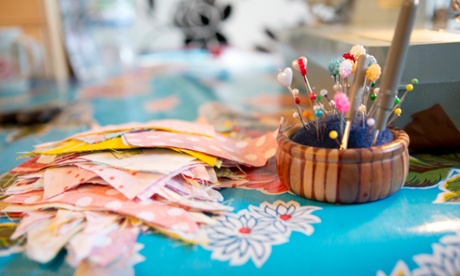
Products and services
So you’re ready to create, market and sell your crafts. Whether that’s jewellery, ceramics, glass or textiles, once you’ve made a decision you need to think about the practicalities.
As a crafter or artist, you can tap into a variety of income streams. Your options include private commissions, working with brands to license your designs and creating and selling your small batched work. You can sell products or services, or a combination of both.
Products are often the easiest option when starting out. But services such as commissions or teaching can be a good addition to your portfolio. They can help to grow your profile and earn you extra income.
A good starting point is to create a small group of related products and services, aimed at a specific group of potential clients. Be selective and only promote your best work. It will save you a lot of time, energy and money.
Time management
You probably want to spend most of your time making, but don’t bury your head in your studio. When you start your business, spend around 40% of your time creating, 40% on marketing, 10% on administration and 10% on professional development. That might sound a lot, but it’s necessary if you want to create a financially stable business.
Goal-setting
Firstly, work out what you want to achieve by the end of the year and think about your financial goals. Identify specific shops, online marketplaces or fairs where you would like to sell. Write down your ambitions for the business and work out how you can achieve them.
Marketing
Commit to trading or exhibiting at at least three consumer events in your first year. Organise something with other local makers, take part in an show or an open-studio event. This will stop you from procrastinating, while helping to build your credibility and profile.
Create a professional online presence as soon as possible. Start with a basic website and grow from there. It’s easy to start selling your crafts online at popular marketplaces, such as Etsy or Folksy. If you want to create your own web shop use specialist e-commerce software like Supadupa, Shopify or Big Cartel.
Pricing
Many craftspeople find it difficult to cost and price their work. You need to understand what to charge consumers (and, later on, trade buyers) to create a sustainable business. Don’t undersell yourself.
All your costs need to be covered by your sales and other income. Calculate how many products you need to sell, and at what price, to break even and then to reach your financial goals.
Pricing is also about positioning yourself correctly in your market. If somebody is able to sell similar products at a higher price than you, then look again at your pricing model. And research your competition. How does your profile, presentation and branding compare to other makers? Is the quality of their skills and materials better than yours? Use your research to learn and adapt.
Christmas planning
Many craftspeople sell most products in the last 10 weeks of the year in the lead up to Christmas. Plan ahead for this.
Take part in Christmas shows. Plan your marketing, newsletters and social media in advance. And keep an eye on your finances and cashflow too; save some of your earnings from this period for the quieter times of the year.
Keep learning
Starting a craft business is exciting. You will have loads of ideas but you don’t need to realise them all in your first year. Make a list of what you want to do and what you need to learn. Speak to other more established makers too; they are often happy to help. There is lots of craft business advice available online or in books and there are many business organisations around the UK to help you with workshops or offer mentoring.
Patricia van den Akker is the director of The Design Trust, the online business school for designers and makers based in London.
Sign up to become a member of the Guardian Small Business Network here for more advice, insight and best practice direct to your inbox.

